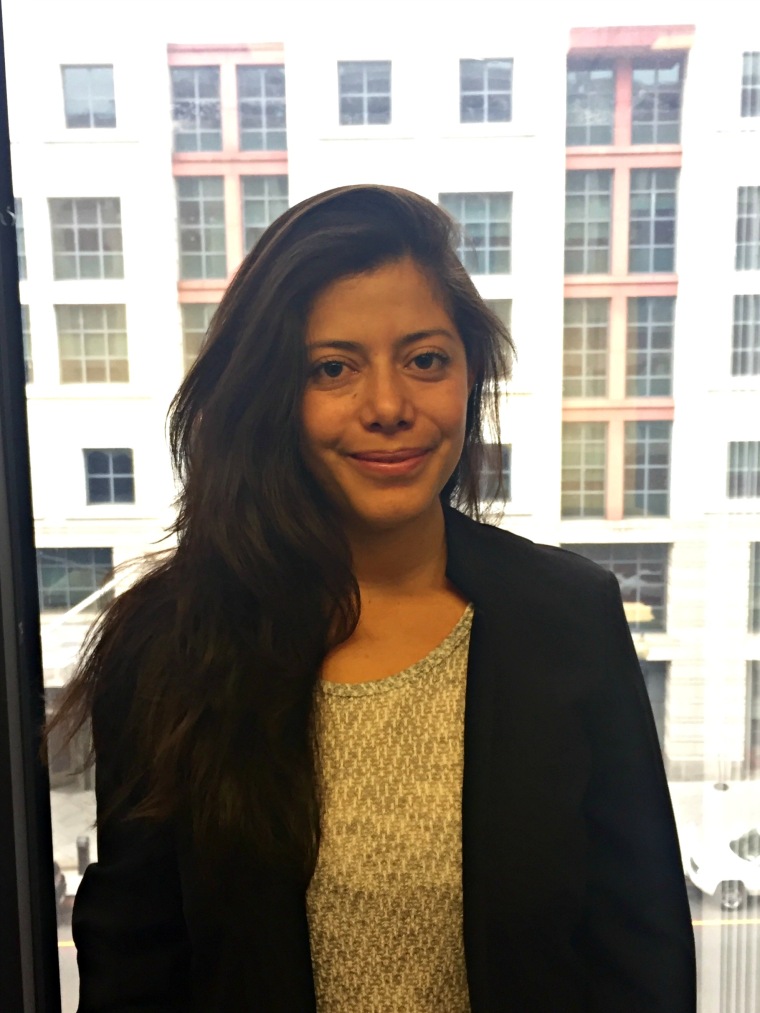
NAME: Michelle Vaca
AGE: 29
HERITAGE: Born and raised in Ecuador, now living in Washington, DC
OCCUPATION/TITLE: Economist, Women’s Bureau in the Dept. of Labor
Michelle Vaca is an economist at the U.S. Department of Labor. Michelle works in topics related to women in the labor force, with a focus and interest in minorities and immigrant women workers. Michelle holds a BS in Economics and International Business from Florida Atlantic University, and a MPA and MA in International Relations from the Maxwell School at Syracuse University.
As a girl, were you in the minority in your math and science classes in high school?
Actually, not at all. To be honest I wasn’t necessarily so self aware at that time. When I look back, I don’t even know if there were more boys than girls. But I do remember that my teacher was a female and an amazing mentor as well as a great teacher, very knowledgeable. I do remember having some very close female friends in those classes with me.
That’s very different from many women’s experience; to what do you attribute that?
Well, in Ecuador we have a little less leeway to pick our courses so I had a lot of math and science classes on my transcripts already. In Ecuador there is a set curriculum and everyone takes physics, advanced math, chemistry, biology and social sciences so I’ve never seen it as a girl vs. boy issue. And I never necessarily felt that because I was a girl I shouldn’t like math. At that point I just wasn’t as into history.
What I think is more interesting is that when I got to my high school in California my counselor in my senior year was like, “Why do you have so much math?” He did end up getting me into AP statistics but I remember distinctly that he was very focused on telling me, “You don’t need to take any more math, you have all you need to graduate.”
Thank goodness that didn’t dissuade you. How did you end up settling on economics?
It’s a very complicated question. I think definitely there’s this perception of an economist crunching very complex mathematical problems – it’s kind of mysterious and broad. But what I was really interested in was public policy and in my case it was very helpful to be comfortable with numbers. With the world and the field of policy now being so data-driven, it’s an advantage to have a working knowledge of those numbers.
What is your work like on a day-to-day basis?
I think it's important people know that being an economist can entail a wide range of responsibilities. My work is in trying to communicate the status and outcomes and the differences women in the labor force of different races and backgrounds face. As a woman, especially coming from a minority, to me it’s a privilege to be able to work in the government and be part of a women’s’ bureau whose mission is to safeguard working women and equality in workplace. Ultimately the stories we can tell with numbers will shape our policy.
Why does the area of policy excite you?
I wanted to improve the world, so to speak, and I wanted to work in research projects in developing countries. So when I was in college, I complemented my quantitative skills with a lot of social sciences in college, like sociology and anthropology, because while numbers are important, they don’t tell the whole story.
Advice for others looking to change the world in a meaningful way?
This is relevant not only to those intent on becoming economists: Take the risk to be interested in and explore something out of your comfort zone. Open your mind and try new things. I was going to be an architect and I wouldn’t be where I am had I not signed up for economics class. It was an exploration of uncharted territory, but you cannot be afraid or be bound by what society expects you. Taking the step to exploring something different will never be a waste – even if you don’t take that new route, it will enrich your future.
Esther J. Cepeda is a Chicago-based journalist and a nationally syndicated columnist for The Washington Post Writers Group. Follow her on Twitter, @estherjcepeda
